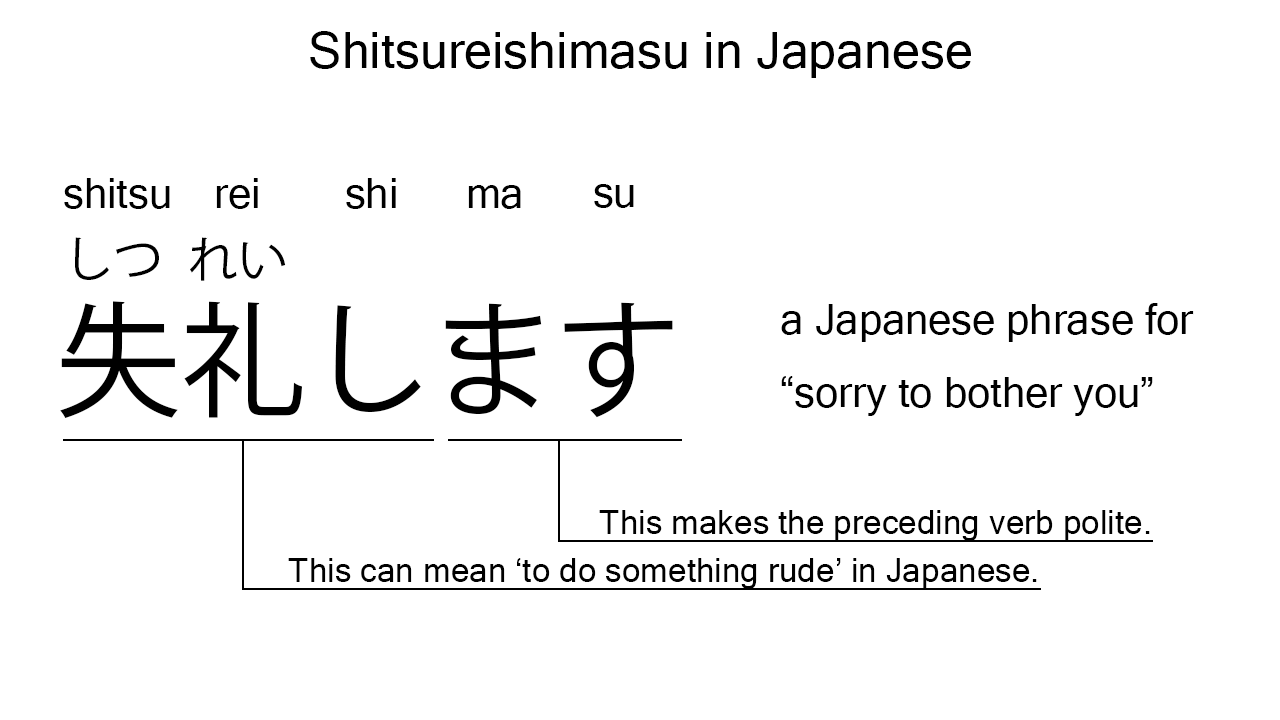What does “shitsureishimasu” mean in Japanese?
Native speakers say “shitsureishimasu” often to mean ‘sorry to bother you’ in Japanese. Perhaps, some Japanese learners know this phrase as it is sometimes used in Japanese conversations. In this blog post, however, I will explain it in detail based on its grammatical components. And also, I will explain how to use it through example sentences. My explanations would help Japanese learners understand “shitsureishimasu” more clearly. Then, let’s get started!
Contents
- Definition and meanings of “shitsureishimasu”
- What does “shitsureishimasu” literally mean in Japanese?
- Summary
Definition and meanings of “shitsureishimasu”
Let me start with the definition and meanings of “shitsureishimasu”.
- shitsureishimasu – 失礼します (しつれいします) : a Japanese phrase for ‘sorry to bother you’, ‘sorry to disturb you’, or just ‘excuse me’ in Japanese.
Japanese native speakers use this phrase when they talk to someone who is doing something else, when they enter someone’s room, or such. With this phrase, they ask for permission for the thing which they are about to do. It’s also worth mentioning here that this phrase is widely considered polite, so suitable for formal situations.
The definition and meanings are not that difficult, I think. To understand this phrase more clearly, however, let me explain its grammatical components in detail, one by one.
What does “shitsureishimasu” literally mean in Japanese?
“Shitsureishimasu” consists of the following two components:
- shitsurei shi – 失礼し (しつれいし) : one conjugation of the verb, “shitsurei suru”, which often means ‘to do something rude’ in Japanese. These two kanji characters mean ‘lacking’ and ‘gratitude’ respectively, so this conjugation can literally mean ‘to do something lacking gratitude’ in Japanese.
- masu – ます : an auxiliary verb used after a verb to make it polite. Probably, this is well known as a part of Japanese masu form. In the phrase, this is used after “shitsurei shi” to make it sound polite.
From these two components, we can understand that the formed phrase is literally the polite form of “shitsurei suru” which means ‘to do something rude’ in Japanese. And actually, it is. Native speakers ask for permission for the thing which they are about to do by saying “I’m doing something rude” in Japanese.

When we meet new Japanese phrases, we should check their grammatical components in detail to understand their meanings clearly and deeply. In many cases, components tell us a lot about the meanings of the phrases they form. Actually, here, we could get the better understanding of “shitsureishimasu” through the detailed check above.
So far, I’ve explained the definition and meanings of “shitsureishimasu” together with its grammatical components. Then, let me explain how to use it through the example sentences below.
Example #1: how to say “sorry to bother you” in Japanese
「shitsureishimasu」 to watashi wa it ta – 「失礼します」と私は言った (「しつれいします」とわたしはいった)
“Sorry to bother you,” I said.
Below are the new words used in the example sentence.
- to – と : a case particle working as a quote marker. In the example, this works after the clause to indicate what the speaker said.
- watashi – 私 (わたし) : a pronoun meaning ‘I’ in Japanese.
- wa – は : a binding particle working as a case marker or topic marker. In the example, this works after “watashi” to make the subject in the sentence.
- it – 言っ (いっ) : one conjugation of the verb, “iu“, which means ‘to say’ in Japanese. In the example, it has been conjugated for the better connection with its following word.
- ta – た : an auxiliary verb used after a verb, adjective, or auxiliary verb to make its past tense form. Probably, this is well known as a part of Japanese ta form. In the example, this is used after “it” to make its past tense form, “it ta”.
This is a typical usage of “shitsureishimasu”. In this example, it works to mean ‘sorry to bother you’ in Japanese. When we want to ask for permission for the thing which we are about to do in Japanese, this phrase is a very good option.
Example #2: another usage of “shitsureishimasu”
「sumimasen, sitsureishimasu」 to kanojo ga it ta – 「すみません、失礼します」と彼女が言った (「すみません、しつれいします」とかのじょがいった)
“Excuse me, and sorry to bother you,” she said.
Below are the new words used in the example sentence.
- sumimasen – すみません : a Japanese phrase for ‘excuse me’ or such.
- kanojo – 彼女 (かのじょ) : a pronoun meaning ‘she’ in Japanese.
- ga – が : a case particle used to make the subject word or the object word in a sentence. In the example, this is used after “kanojo” to make the subject in the sentence.
This is another typical usage of “shitsureishimasu”. In this example, it works together with another phrase, “sumimasen”. Japanese native speakers sometimes use this combination to be more polite. It’s worth knowing, I think.
Summary
In this blog post, I’ve explained the definition and meanings of “shitsureishimasu” in detail based on its grammatical components. And also, I’ve explained how to use it through the example sentences. Let me summarize them as follows.
- shitsureishimasu – 失礼します (しつれいします) : a Japanese phrase for ‘sorry to bother you’, ‘sorry to disturb you’, or just ‘excuse me’ in Japanese. Japanese native speakers use this phrase when they talk to someone who is doing something else, when they enter someone’s room, or such. With this phrase, they ask for permission for the thing which they are about to do. It’s also worth mentioning here that this phrase is widely considered polite, so suitable for formal situations. From the grammatical point of view, this phrase is literally the polite form of “shitsurei suru” which means ‘to do something rude’ in Japanese. This means, native speakers ask for permission for the thing which they are about to do by saying “I’m doing something rude” in Japanese.
Hope my explanations are understandable and helpful for Japanese learners.
Leave a Reply